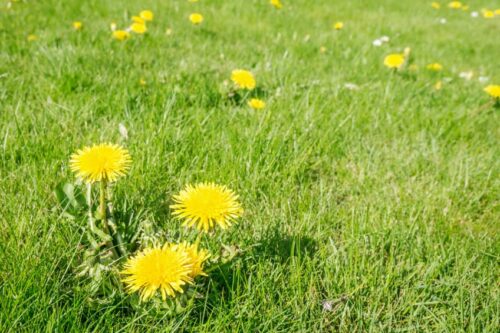Weeds are a constant nuisance in every garden or yard, and sometimes you have to bring out the big guns, such as using lime.
However, will lime kill weeds as well as people claim it will?
Disclosure: This article may contain affiliate links – that means we may receive a commission if you make a purchase after clicking on these links. This is at no extra cost to you.
Lime will not kill weeds directly; however, it does change the pH of the soil, making it more alkaline instead of acidic, and most unwanted weeds thrive in acidic environments. The change in pH can also increase grass growth, and in turn, the healthy grass can overpower and prevent weed growth.
So, we know so far that lime is beneficial to a neglected or nutrient-starved lawn. However, you may be wondering if lime is always lawn safe, what types of lime are acceptable for eliminating weeds, or the full array of benefits. In this article, we’ll cover all your lime questions for your yard.
Can Lime Kill Weeds?
Lime is not exactly a weed killer. However, it will raise the soil’s pH level to a more neutral position; this lower acidity level makes it difficult for weeds to grow.
Additionally, lime will increase calcium and magnesium levels in the soil, making it nutrient-rich. This spurs on healthy grass growth, which will eventually overpower and essentially eradicate the weeds.
Lime is also good for keeping pests away by making it unideal to live in. These infestations can cause your grass to weaken and become fragile, which allows room for weeds to completely take over the entire lawn.
Is Lime a Good Weed Killer?
Lime is a good weed preventative for multiple reasons:
- Provides nutrients. Lime supplies nutrients for the lawn, which can help maintain strong grass and repair damage caused by drought, heat (especially when you’ve cut your lawn below two inches), and walking or vehicles driving over the grass.
- Removes toxins in the soil. Lime can reduce the negative effects of toxins such as iron or aluminum.
- Nurtures helpful bacteria. Everything has bacteria, including your grass. Lime can help the growth of good bacteria while targeting the bad stuff.
- Removes acidity. The more neutral the pH, the healthier the grass roots become, which means less invasive plants moving in.
Which Lime is Best for Killing Weeds?
Dolomitic and calcitic are the most recommended types of lime to use to eliminate weeds. There is a preference for calcitic because it provides the grass with magnesium and calcium, which is incredibly useful for plants or grass of all varieties.
Do NOT use slated, hydrated, burnt, or quick lime as these are not recommended and could potentially cause severe damage to your lawn and even yourself.
Will Lime Kill Grass?
Using lime will not kill your grass in most circumstances (always read the product label before use). However, you’ll want to have your soil tested because its pH is a large factor in if the lime will cause problems.
You’ll need to purchase an at-home soil testing kit, which can be purchased at local stores or Amazon.
Companies that sell lime do encourage people to have their soil tested in a state facility or university. They will give you better accuracy and may even be able to inform you of how much lime you’ll need exactly.
The below table shows you the ranges for recommended lime use according to your soil’s current pH levels:
| pH 5.9 and below | pH 6.0-7.0 | pH 7.1 and above |
| Acidic | Normal range | Alkaline |
| Lime will not harm the lawn | Use lime sparingly on the lawn | Do not add lime to the lawn |
Any lime usage on grass or soil that tests above a pH of 7 can cause nutrient absorption issues. With that said, if your soil is at a pH of 7 or above, it is recommended you do not use lime; doing so will damage the soil and therefore affect your grass and plants. It is also recommended that you do not use more than 50 pounds of lime in a 1000 square foot area in one sitting either, as this can skyrocket your soil’s pH level.
Best Practices for Applying Lime to the Yard
Here are the best ways to apply lime to your lawn to ensure you can effectively get rid of weeds while keeping you and your grass safe:
- Keep safety precautions in mind. Before applying lime, it is best to make sure your legs, arms, hands, and mouth are covered with protective garments or gear; lime is great for your yard but bad for the skin and lungs!
- Apply before seeding. Lime is most effective when used before any seed or sod has been used. Mix the lime within the top five inches of soil. It’s also recommended to spray the ground down with a hose after application to let the lime sink in.
- Use an aerator on an established lawn. If you already have grass or sod down, the most effective way to use lime is to use a core aerator, mix the lime into the grass, and spray it down with a hose. Be aware that this will not be nearly as effective as using the other previous method.
- Avoid overapplication. Lime, while beneficial in the prevention of dry, dead grass, weeds, fungi, or moss, can also be incredibly damaging. An overabundance of lime in your soil can take the pH into alkaline territory, causing the grass to starve. Even if the ground is nutrient-rich, the pH will prevent a significant amount of absorption; this can cause the yellowing of plants and kill them.
- Avoid under-applying. Using too little lime can leave your soil acidic, which means bugs and weeds. Make sure you use an appropriate amount according to your soil’s pH level; this will prevent needing to reapply the lime after grass or sod has been put down.
- Where to get garden Lime – You can get quality garden lime suitable for your yard here.
Final Thoughts
We know weeds contribute to the demise of grass and plants because they compete for sun, food, and air—all things your grass needs to grow and stay healthy.
Luckily, with the right amounts of lime, you can bring your soil’s pH up to a level that makes it a challenge for those weeds to grow.
Although the lime won’t directly kill the weeds, it will allow your grass to grow stronger and overpower any unwanted plant growth while ensuring the soil is unfit for future weed growth.


